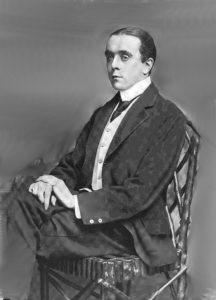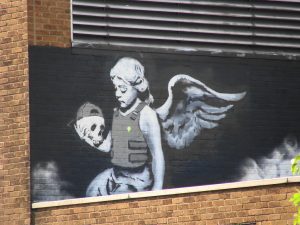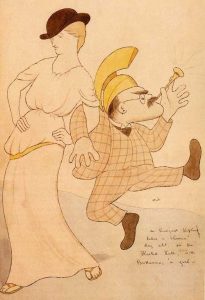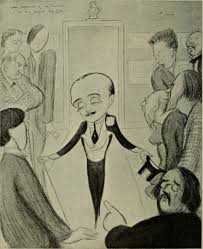Sir Henry Maximilian Max Beerbohm was born on 24, August 1872 in 57 Palace Gardens Terrace, London. He was an essayist, caricaturist, and parodist. His caricatures are on display in collections even now.
Only mediocrity can be trusted to be always at its best.
Table of Contents
Max Beerbohm Biography
Born to Julius Ewald Edward Beerbohm and Eliza Draper Beerbohm, Henry Maximilian Beerbohm was the youngest of the nine children. He was the younger half-brother of the actor and producer, Sir Herbert Beerbohm Tree.

He was adapted to fashionable society from his childhood. Beerbohm published sharp and amusing essays in the famous Yellow Book, while still an undergraduate at Merton College, Oxford.
Max Beerbohm Oxford
Beerbohm began writing at this school. At Oxford, Beerbohm befriended Oscar Wilde through his half-brother, Herbert. Beerbohm signed all his drawings as “Max”, as his loved ones affectionately addressed him with that name.

He was not a good student academically but was a recognized name in Oxford social circles. In 1893, Beerbohm started submitting articles and caricatures to London publications.
Early Life and Career
He left Oxford without a degree but made his name as a humorist and witty writer and artist. Oscar Wilder once said of him, “The gods have bestowed on Max the gift of perpetual old age.”
He left for the United States of America in 1895 as a secretary to his half-brother Herbert Beerbohm Tree’s theatrical company. He was immediately fired for spending too many hours trying to fix the business correspondence.
The Works of Max Beerbohm
Max Beerbohm’s first literary collection, The Works of Max Beerbohm was published after he returned to England in 1896. He followed George Bernard Shaw as drama critic for the Saturday Review, where he remained until 1910.

In his final review piece, wrote about Beerbohm, “the younger generation is knocking at the door, and as I open it there steps spritely in the incomparable Max.”
In 1910, Beerbohm married the American-born British actress Florence Kahn and they settled in Rapallo in Italy, except for a return to England for the duration of World War I and World War II.
As a Caricaturist
Beerbohm curiously never learned to speak Italian in the five decades that he lived in Italy. Some of his best-known works include A Christmas Garland, Seven Men, and Zuleika Dobson, the latter being his only novel.

Max Beerbohm displayed great skills at observant figure sketching, while a student at Oxford University. His professional caricaturist career began when he was twenty.
Beerbohm as a Writer
In 1892, he published thirty-six of his drawings of ‘Club Types’ in Strand Magazine. His caricatures struck a chord; they remained civilized criticism and seldom alienated their subjects.
He targeted two famous personalities particularly – John Bull and Rudyard Kipling. His influences included French cartoonists such as “Sem” and “Caran d’Ache”.
Later Life of Max Beerbohm
In spite of mocking the successive generations of the royal family caricaturing, he was knighted in 1939. The Times addressed Beerbohm in 1913 as “the greatest of English comic artists” by Bernard Berenson.

After his wife’s death in 1951, Beerbohm lived with his secretary, Elizabeth Jungmann. He married her a few weeks before his death at 84.